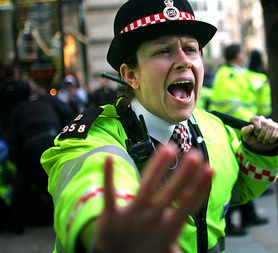Tomlinson case: IPCC inquiry to look at fresh claims
The Independent Police Complaints Commission launches an investigation into fresh allegations that the police withheld evidence in the Ian Tomlinson case.
The IPCC said its painstaking report on the case, which was published today, did not consider this “further allegation”.
It had earlier today concluded there was “no evidence” that the police set out to cover up the circumstances of Ian Tomlinson‘s death.
However, the police watchdog told Channel 4 News it will now be looking into claims that three constables reported seeing Mr Tomlinson being struck with a baton and pushed to the ground at the G20 protests – but that this information was not passed on to the IPCC.

The claims, published in The Guardian, would be looked into separately, the IPCC said.
“Our investigation found no evidence that any press officer set out to mislead anyone.” Deborah Glass, IPCC
The news comes as the IPCC wrapped up its report on the case, which is one of the largest investigations it has ever undertaken.
IPCC Deputy Chair and Commissioner for London, Deborah Glass, said of the report: “While it does not make the circumstances of Mr Tomlinson’s death any less disturbing, our investigation found no evidence that any press officer, or any police officer responsible for agreeing media lines, set out to mislead anyone.
“Nor have we seen any evidence that the police attempted to cover up the circumstances of Mr Tomlinson’s death.”
The investigation gathered 1,200 hours of footage, 200 statements and hundreds of photos of Mr Tomlinson and of the officer who struck him, PC Simon Harwood.
Mr Tomlinson, 47, was struck on the thigh and pushed by PC Harwood in April 2009, during a police operation to clear protestors during the G20 demonstrations.
More from Channel 4 News - Ian Tomlinson: timeline map
Mr Tomlinson’s family called for a manslaughter trial last week after an inquest jury ruled that he was unlawfully killed.
The Crown Prosecution Service decided in July last year that no prosecution would be brought against PC Harwood, though it is now reviewing the decision in light of the inquest.
Ms Glass said: “I know that the CPS is now reviewing its decision not to prosecute. Whatever they decide following that review should not prevent the misconduct proceedings now being heard, and I urge the Metropolitan Police to hold the hearing as soon as possible.”
The IPCC’s report also looked into the conduct of police press officers during the case, but found no evidence of misconduct.
Ms Glass said: “It is entirely understandable that the Tomlinson family, having learned of key evidence about the circumstances of Ian Tomlinson’s death from the media rather than the police or the IPCC, should feel angry and aggrieved, and believe that the police had tried to cover it up.”
She said the media had played a “crucial role” in obtaining evidence, without which Mr Tomlinson’s death may not have resulted in a criminal investigation.
The IPCC did find, however, that one officer was “reckless in his briefing” to the pathologist, though he has been cleared of misconduct on the basis that it would not have affected the pathologist’s findings.
